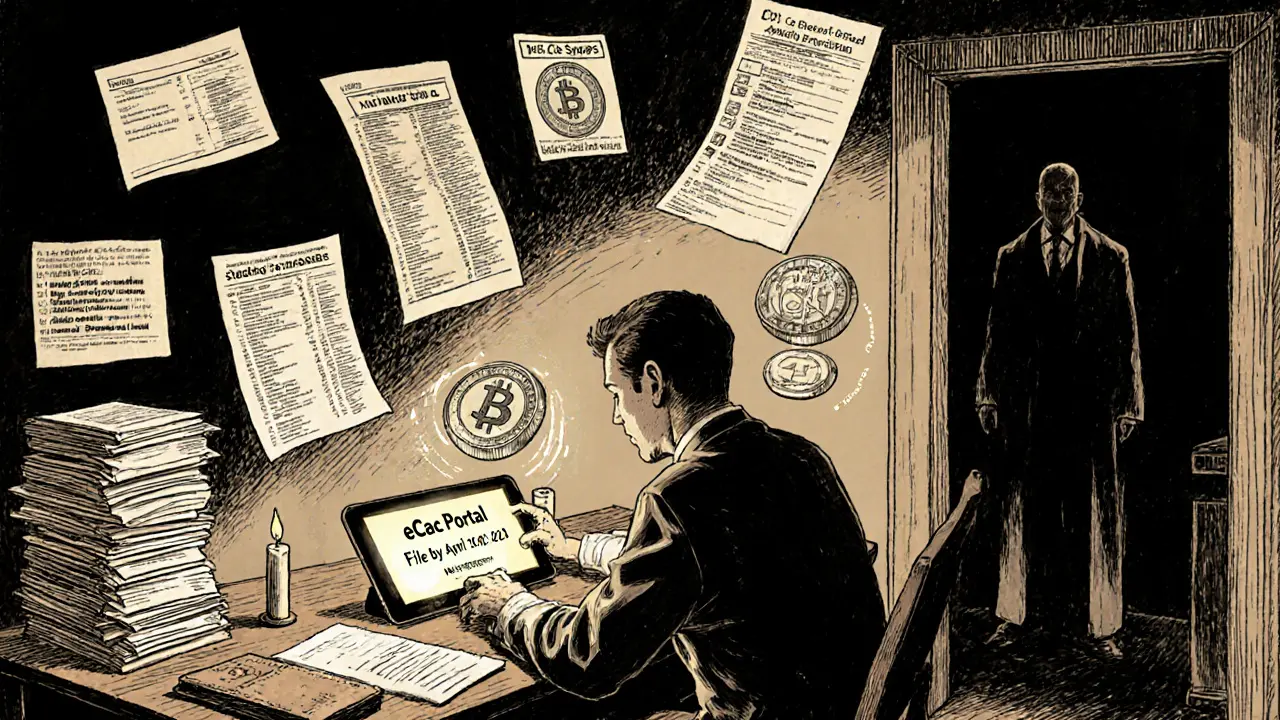Brazil Crypto Tax Calculator
Calculate your capital gains tax for cryptocurrency transactions in Brazil under the new 17.5% tax rate effective June 12, 2025. The tax applies to all profit from selling crypto for reais, trading one cryptocurrency for another, or earning staking rewards.
Results
Enter purchase and sale values to see your tax calculation.
When you sell Bitcoin for reais, trade Ethereum for Solana, or earn staking rewards in Brazil, the government now takes 17.5% of your profit - no exceptions, no loopholes. This isn’t a suggestion. It’s the law, effective June 12, 2025. The Receita Federal do Brasil (RFB) has shut the door on years of loose crypto taxation, and now every crypto transaction above BRL 5,000 per month must be reported - or you risk fines, penalties, and audits.
What’s Actually Taxed?
The 17.5% flat tax applies to everything that counts as a capital gain. That includes:- Selling crypto for Brazilian reais (BRL)
- Trading one cryptocurrency for another (like BTC to ETH)
- Earning staking rewards or mining income
- Receiving crypto as payment for goods or services
- Any DeFi activity that results in profit
There’s no longer a tax-free allowance. No “first BRL 1,000 is free” rule. No exemption for small trades. Even if you made BRL 6,000 in profit from five small trades in a month, you owe tax on the full amount. The RFB treats crypto like stocks or real estate - profit is profit, no matter how you made it.
When and How to Report
The Brazilian tax year runs from January 1 to December 31. All crypto activity must be reported by April 30 of the following year. For the 2025 tax year, the deadline is April 30, 2026.You file through the eCac portal, the RFB’s official online tax system. But here’s the catch: eCac wasn’t built for crypto. There’s no dedicated crypto form. You have to manually enter every transaction - buy date, sell date, amount bought, amount sold, value in BRL at the time, and net gain or loss. Many users report the system gives no guidance for crypto-specific scenarios. One trader in São Paulo told me he spent 40 hours just organizing his 2024 trades before he could even start filing.
Record keeping is now non-negotiable. If you used Binance, Kraken, Coinbase, or a local exchange like Mercado Bitcoin, you need to export transaction histories from each. If you held crypto in a wallet like MetaMask or Trust Wallet, you must track every incoming and outgoing transaction manually. Missing one trade could trigger an audit.
Why 17.5%? And Why Now?
Brazil’s crypto market exploded between 2021 and 2024. Over $43.5 billion in crypto transactions flowed through Brazilian platforms in just the first nine months of 2024 - a 24.2% jump from the year before. The government saw an opportunity: a growing, largely unregulated asset class generating real wealth, but paying little to no tax.Finance Minister Fernando Haddad called the new rule “fiscal fairness.” Crypto investors were no longer getting special treatment. If you made money on stocks, you paid tax. Now, if you made money on Bitcoin, you pay the same rate: 17.5%. It’s simple. It’s predictable. And it’s designed to bring in billions.
Compared to other countries, Brazil’s rate sits in the middle. Germany lets you avoid tax if you hold crypto for over a year. The UK gives you a £3,000 annual allowance. Portugal taxes short-term gains at 28%. Brazil’s 17.5% is higher than the U.S. federal rate for most middle-income earners, but lower than Portugal’s and without any holding period discounts.

Who’s Affected the Most?
Retail investors - especially those who trade frequently - are feeling the squeeze. Before June 2025, small trades under BRL 5,000 per month were ignored. Now, every trade above that threshold counts. A day trader making 10 small buys and sells a week could easily hit the limit. Their gains add up fast, and so does the paperwork.One Reddit user from Belo Horizonte shared his experience: “I used to buy $100 of Dogecoin every Friday, sell it on Monday for $110. I did that for two years. I made BRL 5,200 total profit. Before, I didn’t report it. Now, I owe BRL 910 in tax - and I have to prove every single trade. I’m done.”
Institutional traders and long-term holders are less affected. The flat rate removes the complexity of tiered tax brackets. No more worrying about whether you held for 6 months or 18 months. Just calculate the gain, multiply by 17.5%, and pay. Some professionals appreciate the clarity - even if the rate is high.
What Happens If You Don’t Report?
The RFB isn’t bluffing. They’ve partnered with major exchanges to get transaction data. If you traded on Mercado Bitcoin or Binance Brazil, they already have your records. Cross-referencing is automatic. If your bank account shows a BRL 20,000 deposit in August and you didn’t report a crypto sale, you’ll get a notice.Fines start at 75% of the unpaid tax, plus interest. In serious cases - like hiding large gains or using offshore wallets - penalties can reach 150%. The RFB can also freeze bank accounts and block asset transfers. One investor in Rio was fined BRL 180,000 after failing to report BRL 80,000 in gains from 2023. He thought he was safe because he used a foreign exchange. He wasn’t.

How to Stay Compliant
You don’t need to be an accountant, but you do need a system:- Export all transaction history from every exchange and wallet you used in 2025.
- Use a crypto tax tool like Koinly or CoinTracker (both now support Brazil’s 17.5% rate).
- Calculate your net gain for each trade: sell value minus buy value in BRL.
- Sum up all gains above BRL 5,000 monthly threshold.
- Apply 17.5% to the total.
- File through eCac by April 30, 2026.
Many users report that Koinly’s Brazil-specific reports saved them hours. The platform auto-imports data from Kraken, Binance, and other platforms, then generates a PDF ready for eCac upload. It’s not perfect - it can’t track every DeFi swap - but it’s the best tool available.
The Bigger Picture
Brazil isn’t just taxing crypto - it’s building a new financial system. At the same time as the 17.5% tax landed, the Central Bank launched pilot tests for Drex, its own digital currency. This isn’t a coincidence. The government wants to control the flow of digital money - whether it’s private crypto or state-backed digital reais.Other Latin American countries are watching. Argentina and Colombia already have crypto reporting rules. Now they’re likely to follow Brazil’s lead. The region could become the first to standardize crypto taxation across borders.
For now, the message is clear: If you profit from crypto in Brazil, you pay tax. No more hiding. No more hoping. The era of tax-free crypto gains is over.
Is there still a tax-free threshold for small crypto trades in Brazil?
No. As of June 12, 2025, Brazil eliminated all tax-free thresholds for cryptocurrency gains. Even if you made BRL 5,001 in profit from a single trade or multiple trades in one month, the full amount is subject to the 17.5% capital gains tax. Previously, small trades under BRL 5,000 monthly were ignored, but that exemption no longer exists.
Do I owe tax if I only trade crypto for crypto, not cash?
Yes. Trading one cryptocurrency for another - like swapping Bitcoin for Ethereum - is treated as a taxable event in Brazil. You must calculate the value of the crypto you sold in Brazilian reais at the time of the trade, then subtract your original purchase cost. The difference is your capital gain, and it’s taxed at 17.5%. This applies even if you never converted to reais.
What happens if I used a foreign exchange like Binance.com instead of a Brazilian platform?
You still owe tax. The Receita Federal do Brasil (RFB) has direct data-sharing agreements with major global exchanges, including Binance, Kraken, and Coinbase. Even if you traded on a foreign platform, your transaction history is accessible to Brazilian tax authorities. Failing to report gains from foreign exchanges can result in fines, penalties, and account freezes. There is no legal loophole for using offshore platforms.
Can I deduct losses from crypto trades to reduce my tax bill?
Yes. Brazil allows you to offset capital losses from crypto trades against capital gains in the same tax year. If you lost BRL 10,000 on one trade but made BRL 15,000 on others, you only pay tax on the net BRL 5,000 gain. Losses cannot be carried forward to future years, so you must use them in the same year they occur.
Do I need to report crypto I still hold and didn’t sell?
No, you only report gains from actual sales or trades. Holding crypto without selling or trading it does not trigger a tax event. However, if you earned staking rewards, mining income, or received crypto as payment, those are taxable income and must be reported at their fair market value in BRL at the time received.
Are NFTs taxed the same way as cryptocurrency in Brazil?
Yes. NFTs are treated as digital assets under Brazil’s tax code. Selling an NFT for crypto or reais, or trading one NFT for another, counts as a capital gain. The 17.5% tax applies to the profit made from the sale or exchange. You must track the purchase value and sale value in BRL, just like with Bitcoin or Ethereum.
Can I use crypto tax software to file my Brazilian taxes?
Yes. Tools like Koinly and CoinTracker are officially supported by the Brazilian tax authority and can generate reports compatible with the eCac portal. These platforms auto-import data from exchanges, calculate your gains and losses, and produce PDF summaries that you can upload directly. While they don’t file for you, they drastically reduce the risk of errors and save hours of manual work.
What if I lost my crypto due to a hack or scam?
Losses from hacks, scams, or wallet compromises are not deductible under current Brazilian tax law. You can only offset losses from actual trades or sales against gains. If your crypto was stolen, you cannot reduce your taxable income. Keep records of the incident, but don’t expect a tax break.

Roxanne Maxwell
October 27, 2025 AT 16:07Man, I just moved to Brazil last year and this tax thing caught me off guard. I thought crypto was supposed to be free like in the US. Now I'm scrambling to get all my trades organized. Koinly saved my sanity though - seriously, if you're doing this, just use it.
Akinyemi Akindele Winner
October 28, 2025 AT 06:54Brazil just turned crypto into a bureaucratic nightmare with a side of arrogance. They call it 'fiscal fairness' - yeah, right. It's just another way for the state to suck the life out of anyone who dares to build wealth outside their control. Welcome to the new feudalism, folks.
Elliott Algarin
October 29, 2025 AT 13:59It's interesting how taxation follows the same logic as any other asset - profit is profit. But the real issue isn't the rate, it's the lack of infrastructure. Imagine having to manually log every DeFi swap like it's 1998. The system is broken, not the people.
Ayanda Ndoni
October 30, 2025 AT 11:41I'm just gonna keep my crypto in a shoebox under my bed. Who needs taxes anyway? I'm not paying some bureaucrat to tell me how to live my life.
Zach Crandall
November 1, 2025 AT 02:32While I respect Brazil's attempt to formalize its crypto framework, the administrative burden is disproportionate. The eCac portal was never designed for decentralized finance. This isn't enforcement - it's entrapment dressed as policy.
MANGESH NEEL
November 2, 2025 AT 08:51People who trade crypto like it's a casino have no right to complain about taxes. You think you're smart buying Dogecoin every Friday? You're just a gambler who got lucky. Pay your damn tax and stop whining. This isn't a charity - it's a country.
Michael Folorunsho
November 3, 2025 AT 20:1417.5%? That’s laughable. In the U.S., we pay 20%+ on long-term gains and we still have deductions. Brazil’s system is primitive. No holding period? No loss carryforwards? You’re punishing innovation. This is why capital flees.
Sean Huang
November 4, 2025 AT 12:37They’re using this tax to track us - it’s not about revenue, it’s about control. The Central Bank’s Drex launch? Coincidence? NO. This is the first step toward digital serfdom. Your wallet is being mapped. Your trades are logged. Your freedom is being erased. Wake up. They want to own your money. They already have your data.
John Murphy
November 5, 2025 AT 00:02I used to think crypto was about freedom but now I see it's just another financial system with rules. The 17.5% is steep but at least it's clear. I spent 3 weeks tracking my trades. It sucked but I did it. No drama. Just pay and move on.
Patrick De Leon
November 6, 2025 AT 07:38Let’s be honest - Brazil’s system is the most rational in Latin America. Germany’s 1-year hold? UK’s £3k allowance? That’s just tax evasion dressed as policy. Brazil says: profit = tax. No excuses. That’s integrity. Stop whining and file your forms.
Ali Korkor
November 6, 2025 AT 23:04You got this. It’s a pain, yeah - but you’re not alone. Export your history, use Koinly, take a deep breath, and get it done. One trade at a time. You’re building something real. Taxes are just the price of playing in the real world.
Jonathan Tanguay
November 8, 2025 AT 21:32Look I’ve been doing this since 2017 and let me tell you nobody understands this stuff except me and maybe one other guy on Reddit who’s actually done the math. The RFB thinks they’re being smart with this 17.5% flat rate but they dont get that crypto isn’t stocks and you cant just treat it like real estate because every transaction is atomic and decentralized and the tax code is written for 1980s brokerage accounts and if you try to manually log every swap on Binance you’ll end up in a mental hospital and I speak from experience because I did it last year and I still have nightmares about the eCac portal and the fact that they dont even have a dropdown for DeFi liquidity pools and if you use a wallet like Metamask and you did a single uniswap v3 trade with a 0.3% fee and the price of ETH was 3200 BRL and you sold it for 3300 BRL and then you moved 0.02 ETH to a cold wallet and then you got airdropped 150 tokens from some protocol you never heard of and you had to convert it to BRL at 0.02 BRL per token and then you had to calculate the cost basis using FIFO because LIFO is illegal in Brazil and the RFB doesnt even recognize time-weighted average and if you use Koinly it still messes up the staking rewards from Curve Finance and I spent 117 hours on this last year and I still got flagged for an audit because I missed one transaction from a wallet I forgot about and now I’m scared to even touch crypto anymore and I swear to god if you’re thinking about trading right now just stop and go hug your dog or something because you’re not ready for this